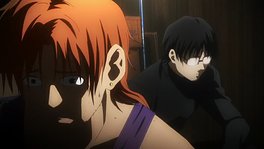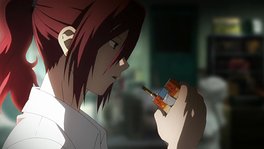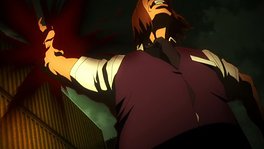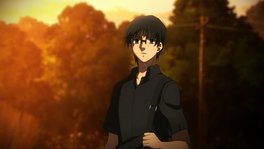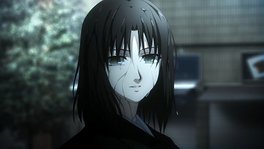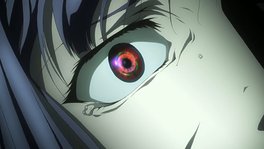If part one of Murder Speculation was grisly, Remaining Sense of Pain is abjectly brutal. Rape, murder and torture all feature heavily in this pitch black story where a girl aggrieved slaughters her tormentors in a most barbaric fashion. Unflinching throughout, this entry in the Kara no Kyoukai series of movies explores the meaning of pain - both emotional and physical - and the nature of murder.
Mikiya is older now, Shiki has awoken from her coma and once again someone is murdering indiscriminately. After caring for a girl in pain he finds on the street, Mikiya is asked by an old school friend to track down a junior who has disappeared. Toko, after splashing out on an extravagant purchase, accepts an unsavoury job and assigns Shiki to track down the murderer. The two investigations converge when it becomes apparent the murderer, Fujino - a classmate of Mikiya's sister Azaka, is after Keita, the classmate Mikiya is tracking down. Regularly raped and beaten by Keita's gang of deviants, Fujino is massacring them one by one, but wracked by unfamiliar pain and hunted by Shiki, her power grows as her sanity slips.
As the movie opens, it is obvious that the gore and dark overtones in the previous movie are back with full force. Beginning with the graphic rape of Fujino in a derelict night club, events transpire that have people's limbs twisted and contorted with sickening results, blood spatter and bones cracking all the while. Harrowing these scenes may be, but as a frame of reference for Fujino's vengeance they are absolutely necessary; only with them can she be portrayed as sympathetic, something that an expository monologue wouldn't be capable of evoking. Voiced by the softly spoken Mamiko Noto, Fujino is both victim and antagonist, often within the same scene and especially when played off against the acerbic Shiki. Their final battle is savage and swift, ending with the iconic destruction of a bridge, likely symbolising the return path now no longer open to Fujino.
Delving into the nature of murder is just one of the threads running throughout the film. In light of what Fujino was subjected to, her ferocious killings seem justified until she lashes out at a passer by which gives Shiki cause enough to confront her. Mikiya on the other hand visibly deplores what Keita and his cronies did to Fujino, but whereas others may have left him to face her wrath, Mikiya shielded him, always preferring to talk rather than fight. Shiki can be seen as a mirror of Fujino with similar marble-eyed abilities and a more pragmatic view on the act of murder; her outlook however is incomplete without knowledge of her upbringing and crucially, her ability to see the death of all things created. The film does not purport to have an answer to the justification of murder only a limited examination of the motives and effects on the people involved. The conclusion feels as though the "right" action has been taken but similarly, other outcomes could be equally satisfying.
The tonal shift from the previous movie is not so great as to be jarring, but the change of locale from small town to densely urban introduces a deep sense of claustrophobia. Harsher colour hues are used throughout: gone are the warm sunsets and delicately cold whites, replaced with streetlight ambers and frigid blues and greens. Weather echoes the character's moods with turbulent storms and serene skies, the atmosphere is pervasive but more bustling and neon than the decaying cityscape portrayed in the first movie. Backdrops are similarly imbued, bold lines and sharp corners for confrontations and a cosy café for a brief spell of lightheartedeness; and in the middle is Toko's office, chaotic and jumbled but familiar, a bastion against the storm.
Meditating on the disposition of murder may be the overarching theme, but this movie is not without its gap filling. Shiki's artificial arm, damaged in the first movie and ignored in the second, is revealed here, Shiki just as aloof and indifferent as ever even over the loss of a limb. Similarly there is a brief mention of her alternate persona, but details as to its current status, whether merged, murdered or ignored is left for another time. More than just concrete details though is the development of both Shiki and Mikiya, their relationship more standoffish than before but no longer is he a shallow, perpetual do-gooder, nor is her acknowledgement of Mikiya's methodology in the first film mere story ephemera. Their characters don't allow for the reciprocal relationship one may expect or desire, but the occasional yielding of Shiki is all the more poignant and the mutual respect despite the name-calling is self evident.
Kara no Kyoukai: Remaining Sense of Pain is a much darker offering than the prior two films and it explores areas difficult to empathise with. Regardless, it retains the same wonder and intrigue that was emblematic of the first two films. Bleakness without respite makes it powerful and emotionally provocative but gone is some of the previous outing's charm that came from the moments of downtime and sometimes fanciful outlook. It is another faultless production by all those involved, Kalafina hit their stride with the third ending song, voice actors are confident in their roles and the visuals are peerless. Despite the production values, the abundant pathos and its obvious importance to the grand story of Kara no Kyoukai it is uncomfortable viewing that smudges the line between entertainment and voyeuristic curiosity; still breathlessly brilliant one can't help but wish for the next film to tone down the torture.

